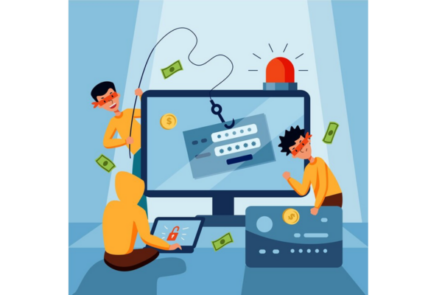
With the rapid growth of digital transformation in the United States, the adoption of digital payments, e-wallets, and online banking transactions has made our lives more convenient. However, it has also opened the door to new cyber threats and financial frauds.
As more people embrace digital solutions, it’s crucial to protect your information and finances. In this article, we’ll explore how you can safeguard your money from online scams and financial frauds.
Know the most common financial frauds in the United States
Before you learn how to protect yourself, it’s essential to understand the types of financial frauds prevalent in the United States. Phishing scams are one of the most common methods, where cybercriminals attempt to steal sensitive data through fake websites or fraudulent messages.
Many scammers impersonate well-known banks or companies, sending emails or SMS messages that lure victims into disclosing confidential information. Other prevalent frauds include identity theft, fake investment schemes, and payment card fraud. Being informed and vigilant is your first line of defense.
Verify the authenticity of websites and apps
With the growing number of digital payment websites and apps, knowing how to differentiate between legitimate and fraudulent ones is crucial. Always ensure the websites you visit have the security protocol HTTPS and a lock icon next to the URL, indicating a secure connection.
When downloading payment or banking apps, only use trusted sources like the Google Play Store or Apple App Store. Additionally, read reviews and check the number of downloads to identify fake apps designed to clone your financial information. Be wary of clicking on links received through unsolicited messages or emails.
Never share personal information
One golden rule to avoid financial frauds is to never share personal information, such as banking passwords, card PINs, or OTPs (One-Time Passwords) over the phone, email, or messaging services. Legitimate financial institutions will never ask for these details.
If you receive a suspicious request, contact your bank directly to verify. Also, avoid clicking on links from unknown sources and refrain from providing personal data on unverified websites.
Use two-factor authentication (2FA)
An effective way to enhance your account security is to enable two-factor authentication (2FA). This additional layer of security requires a second verification step, such as a code sent via SMS or an authenticator app, in addition to your password.
This means that even if someone discovers your password, they would still need the code to access your account. Activate 2FA on all your banking services, digital wallets, and social media accounts to add a crucial level of protection.
Keep your device secure and up to date
Online safety is also dependent on the measures you take to secure your devices. Regularly update your operating system and all apps, as updates often fix security vulnerabilities. Install a reputable antivirus software and avoid downloading programs or apps from untrusted sources.
When using public Wi-Fi networks, such as in cafes or airports, consider using a VPN to secure your connection, as these networks are more vulnerable to data interception attacks.
Beware of fake investment offers and rewards
One of the most common types of financial frauds involves promises of quick financial returns or fake rewards. Deceptive advertisements for miraculous investment schemes that guarantee high profits in a short time are a significant red flag.
Be cautious of investment opportunities that promise risk-free gains or require advance payments to claim a prize. Research the company offering the product or service and look for reviews and other users’ experiences to ensure the offer’s authenticity.
Stay informed and updated
As new financial frauds emerge, staying informed is key to protecting yourself. Follow official portals, such as the Federal Trade Commission (FTC) and the Consumer Financial Protection Bureau (CFPB), which regularly issue alerts about ongoing scams and new threats. Reading the news and keeping up with cybersecurity updates can help you identify suspicious behavior and avoid falling victim to scams.
What to do if you fall victim to a financial fraud
If you fall victim to financial fraud, it’s essential to act quickly. Contact your bank or payment provider immediately to freeze compromised accounts or cards. Report the incident to the Federal Trade Commission (FTC) and provide all relevant details. The sooner you act, the better the chances of reversing the situation or at least minimizing the loss.
Stay tuned!
Online financial security is an ongoing responsibility that requires attention and informed practices. With the rise in digital transactions in the United States, adopting security measures and being aware of the most common threats are crucial steps to protect your money. Share these tips with your friends and family to help them stay financially secure and build a broader network of protection.
Protect your finances with these simple practices and stay a step ahead of scammers. For more safety tips and guidance, visit our portal Utua and learn how to secure your money in the digital world.
